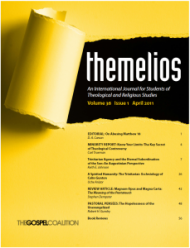Justin Taylor's Blog, page 331
May 7, 2011
The Goal of Christian Scholarship
I don't believe our goal as Bible or theology scholars is to be deemed among the finest of scholars or to find a place at the table, but to be faithful to Jesus Christ and to the gospel and to orthodox theology and to academic rigor. Yes, we are to work to discover and to be creative, but the driving passion to prove ourselves at the feet of others falls short of a true Christian telos. I'd put it this way: we are called to be faithful, whether we are accepted or not.
May 6, 2011
Infertility and Mother's Day
Mother's Day is a painful day for many in the church. Russell Moore offers a good suggestion for pastors.
(Dr. Moore was recently on FamilyLife with Dennis Rainey and Bob Lepine, and you can read or listen to their discussion on infertility, adoption, and the rearing of children who were adopted.)
I was also reminded of a section from a Mother's Day sermon by John Piper where he addressed some various issues of pain that can be associated with this day:
There are millions of single women, and many will stay single.
There is a grace from God for that—a very special grace and for some even a calling.
There are women who are single mothers and the marriage element in the calling I just described is painfully missing.
Jesus Christ has a grace for that.
There are women who are married and cannot, or, with their husbands, choose not, to have children.
Jesus has a grace for that.
Update: I thought this comment below from a wise brother was worth highlighting:
Pastors, if there are two things I would add they would be as follows.
First, please avoid making a distinction between mothers and non-mothers in a physical way (e.g. having all the moms stand up or giving flowers to all the moms). I well remember sitting in a Father's Day service where all the dads were asked to stand. I felt like there was a huge neon sign over me that kept flashing "not able to have kids, not able to have kids." My wife felt it keenly as well: she began to weep. The most pastorally sensitive leaders I know avoid this like the plague. Instead, they acknowledge the day and proceed to pray earnestly for the full range of emotions that are being experienced on that day (since it is often quite painful, not just for those unable to have kids, but for those estranged from their moms, those moms who are estranged from their kids, those who have recently lost a mother, etc.).
This leads to the second thing. As Moore indicates, it is important to recognize that there are many conflicting emotions going on during a Mother's Day service. It is crucially important to pastor all the people through that time. Here is the prayer I would offer on Mother's Day:
Heavenly Father, on a day like Mother's Day there are so many different emotions that we bring to you.
Some of us bring emotions of deep gratitude and joy for the mothers you have blessed us with, mothers who have
loved us,
cared for us,
walked with us
and taught us how to live well.
We praise you for such love shown to us through our moms and we pray for all those who are moms, that you would give them:
strength where they are weak,
wisdom where they are unsure,
patience with the many demands placed upon them,
faith in your care for them and their families,
and love—deep love—for those whom you have given them to nurture.
Others of us bring emotions of sadness and pain. Some of us are saddened because our relationship with our mom is not easy, or was not easy, or perhaps never existed at all.
Please
meet us in our pain,
heal our hearts where they are wounded,
soften our hearts where they are hardened,
and enable us to forgive and to love even those who have hurt us.
Others of us are saddened because we long to be moms, long to have children, and yet are not able to do so.
Father of mercies,
give us comfort in our sadness,
trust in you despite unfulfilled longings,
and joy in knowing that you never stop loving us or having our best in mind.
We pray these things to you as our Father, who loved us before the world began, and will love us forevermore.
In Jesus' name, amen!
The Gospel as a Three-Legged Stool?
 I found John Starke's respectful iron-sharpening-iron tweaking of Trevin Wax's three-legged stool analogy for the gospel to be a helpful improvement.
I found John Starke's respectful iron-sharpening-iron tweaking of Trevin Wax's three-legged stool analogy for the gospel to be a helpful improvement.
Instead of saying that (1) story, (2) announcement, and (3) community are the three equal legs of a stool, Starke explains his alternative:
So here is my counter-solution to Wax's "three-legged stool." In keeping with the "stool" illustration, let's say the the gospel (its saving powerful announcement and definition) is the stool itself, not just one of the legs, but the entire support system.
The legs that support the gospel are the (1) the story, since it gives the gospel its context; (2) the community of a local church that encourages us to preserve the gospel and live in accordance with it; and (3) good works and holiness as the fruit of new birth and a life that is empowered by the Spirit.
Some of these legs will be weaker than others at times, but it is by grace alone through faith alone in Jesus Christ that we are saved.
This seems helpful to me. I think one can agree with virtually everything in Trevin's helpful work while wanting to find a more compelling version of the metaphor.
I'm thankful for discussions like this as we seek to articulate and advance the gospel together as brothers and sisters.
May 5, 2011
Moms Need To Constantly Pray
From Elyse Fitzpatrick and Jessica Thompson, Give Them Grace: Dazzling Your Kids with the Love of Jesus (coming this month from Crossway):
Here are five simple words for you to take with you every day: Manage, Nurture, Train, Correct, and Promise. The beginning letters of these five categories are MNTCP. You probably know how making an acrostic can help you remember certain important facts. This is one that will help you remember these categories and will also remind you of one more very important aspect of your parenting—prayer . . . . The acrostic can also stand for Moms Need To Constantly Pray.
Does this circumstance simply call for management?
Now that the situation has calmed down, do I have an opportunity to nurture his soul with the gospel?
Is this the time to train him in how to apply what Jesus has already done for him?
Do I need to correct her attitudes or actions so that they are more in line with the good news?
Should I remind him of God's promises, either of blessing for faith or of punishment for unbelief?
Finally, is this just a time for me to pray and ask the Lord to show me how the gospel applies to my own heart? Do I need clarity to understand why my child is struggling or resisting right now? Do I need clarity into my heart's responses so that I am not sucked down into her unbelief, anger, and despair? What is it that bothers me about his attitude? Why?
Yes—But What About the Alternative?
A quote from Millard Erickson's Christian Theology had a significant impact on me the first time I read it several years ago:
. . . In criticism it is not sufficient to find flaws in a given view.
One must always ask,
"What is the alternative?"
and,
"Does the alternative have fewer difficulties?"
John Baillie tells of writing a paper in which he severely criticized a particular view. His professor commented,
"Every theory has its difficulties, but you have not considered whether any other theory has less difficulties than the one you have criticized." (p. 61)
The following little clip of Phil Donahue interviewing Milton Friedman is a good example of this principle at play.
My point of posting this is not to defend capitalism (though I believe it can be defended from a biblical worldview.) But the main reason for posting it is that is serves as a nice illustration of the fact that criticizing a theory is insufficient if one's alternate theory is equally weak or worse.
Susan Hunt: Redeeming Womanhood
Susan Hunt is a wonderful gift to the church.
Below is a workshop presentation she gave at the 2011 Ligonier conference.
In her talk she mentions a three-year discipleship program she developed for mentoring teen girls. Over the three-year period leaders are to read the following books, which would be helpful for any woman to consider:
Spiritual Mothering: The Titus 2 Model for Women Mentoring Women
By Design: God's Distinctive Calling for Women
The True Woman: The Beauty and Strength of a Godly Woman
Women's Ministry in the Local Church
The Legacy of Biblical Womanhood
(You can watch the video below, or download the audio here.)
Biblical Principles for Handling Conflict
 Alexander Strauch's latest book has just been published, and the title is based on Galatians 5:15: If You Bite and Devour One Another: Biblical Principles for Handling Conflict. He explains in the introduction his aim and his outline:
Alexander Strauch's latest book has just been published, and the title is based on Galatians 5:15: If You Bite and Devour One Another: Biblical Principles for Handling Conflict. He explains in the introduction his aim and his outline:
My aim for this book is to provide a better understanding of what the Bible teaches about conflict and to help believers learn how to respond to conflict according to biblical principles.
In order not to present an overwhelming amount of information, the book focuses strictly on the presentation and exposition of scriptural passages that address conflict in the New Testament churches. . . .
The manageable size and easy-to-remember outline of this book make it a helpful resources for anyone who is dealing with conflict and for church leaders who are teaching God's truth about handling conflict.
The first three chapters lay down the foundational biblical principles:
(1) Act in the Spirit
(2) Act in Love
(3) Act in Humility
The remaining seven chapters deal with specific principles for handling conflict:
(4) Control the Anger
(5) Control the Tongue
(6) Control the Criticism
(7) Pursue Reconciliation
(8) Pursue Peace
(9) Face False Teachers
(10) Face Controversy
May 4, 2011
Beware of Surface-Level Exegesis
In his excellent of Bart Ehrman's latest book Forged: Writing in the Name of God—Why the Bible's Authors Are Not Who We Think They Are, Michael Kruger identifies one of Ehrman's critical strategies: "Ehrman appeals to supposed theological and doctrinal disagreements between books as evidence that they could not be written by the same author." Kruger notes, "While Ehrman is an expert in textual criticism, it is clear that he is not as comfortable in the areas of biblical exegesis and systematic theology."
Here's an example. Ehrman highlights Ephesians 2:5–6, which teaches, "Even when we were dead through our trespasses, God made us alive together with Christ . . . and raised us up with him and seated us with him in the heavenly places."
Ehrman strangely argues: "Here believers have experienced a spiritual resurrection . . . precisely the view that Paul argued against in his letter to the Corinthians!" (p. 111, emphasis his).
Kruger writes, "This surface-level exegesis, however, does not do justice to the complexities of Paul's thought."
Watch as Kruger patiently explains the verse in context. This is a helpful example of how and why we need to read the text carefully and charitably instead of settling for surface-level criticism.
The context of Eph 2:5–6 is not dealing with the resurrection at all, but with spiritual conversion. The fact that this passage uses the root word ζωοποιέω ("to make alive") does not necessarily mean it is referring to the resurrection because Paul uses this same term elsewhere to refer to conversion, namely in 2 Cor 3:6 and Gal 3:21 (both undisputed Pauline letters!).
Neither does describing believers as already seated with Christ in the heavenly places demonstrate that Ephesians teaches a non-bodily resurrection. Rather, such language is just another instance of Paul's already-but-not-yet theological paradigm. In Paul's mind, our present conversion is a down payment that guarantees our future place in heaven with Christ—so much so that he is able to speak of it as if it were, in some sense, already here.
Beyond all of this, are we really to think that early Christians would have widely affirmed the canonicity of Ephesians if it so plainly denied the bodily resurrection, one of the most cherished beliefs in early Christianity? Ehrman would have us believe that all early Christians (not to mention later Christians) were just too blind to notice such a thing until modern scholars have come along to point it out for them.
You can read the whole review .
5 Myths and 5 Truths about Forgiveness
A helpful article from Sam Storms on "Forgiveness: What It Is and Isn't."
(The best book-length treatment I know of on forgiveness is Chris Brauns's Unpacking Forgiveness: Biblical Answers for Complex Questions and Deep Wounds.)
Themelios 36.1
 The Gospel Coalition has published the latest issue of Themelios online.
The Gospel Coalition has published the latest issue of Themelios online.
It is available as a 181-page PDF and in HTML.
Seven substantive articles and 60 book reviews. A gift to the church for help in thinking through serious issues.
Justin Taylor's Blog
- Justin Taylor's profile
- 44 followers













